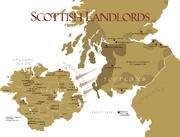
The migration of the Ulster Scots into Ulster
The Ulster Scots are an ethnic group in Ireland descended from Lowland Scots and Northern English settlers who settled in Northern Ireland starting with the Plantation of Ulster in 1609. Following the failed Irish rebellion of Hugh O'Neill, Earl of Tyrone and the ensuing "Flight of the Earls", King James I of England sanctioned a migration of Presbyterian, Anglican, and Methodist settlers from Dumfries, Galloway, Lanarkshire, Renfrewshire, Ayrshire, Scottish Borders, Northumberland, Cumbria, County Durham, Yorkshire, and (to a much lesser extent) the Scottish Highlands onto land confiscated from the fled Gaelic nobility. Planter overlords dragged tens of thousands of peasants with them, and many of these tenant farmers rose to become small landowners and farmers in their own right, though many lived lives of abject poverty. After the Cromwellian conquest of Ireland (1649-1653), many Parliamentarian soldiers settled permanently in eastern Ulster. The majority of Ulster's Protestants sided with King William II of England against King James II of England's Catholic Jacobites during the Williamite War in Ireland in the 1690, and the late 1690s saw tens of thousands of Scots flee famine in Scotland and settle in Ulster. After the 1690s, the Scottish settlers gained numeric superiority in Ulster, but they and the Catholics were both disadvantaged by the Penal Laws, which benefited the Anglo-Irish landlord elite, native Irish converts to Anglicanism, and the descendants of English settlers. This disenfranchisement caused many Scots-Irish to emigrate to the Thirteen Colonies and the United States over the next several decades (200,000 from 1717 to 1775), while many Ulster-Scots Presbyterians sided with the United Irishmen during the Irish Rebellion of 1798. The British government relaxed the Penal Laws after the rebellion's suppression, allowing for the Presbyterian-Catholic enmity to resume. This enmity boiled over in "The Troubles" from 1969 to 1998, with Ulster Scots mostly supporting continued union with Britain (and many joining loyalist paramilitaries such as the UDA and UVF). By 2021, Ulster Protestants made up 37.3% of Northern Ireland's population, while Catholics represented 42.3% and 17.4% were irreligious.
